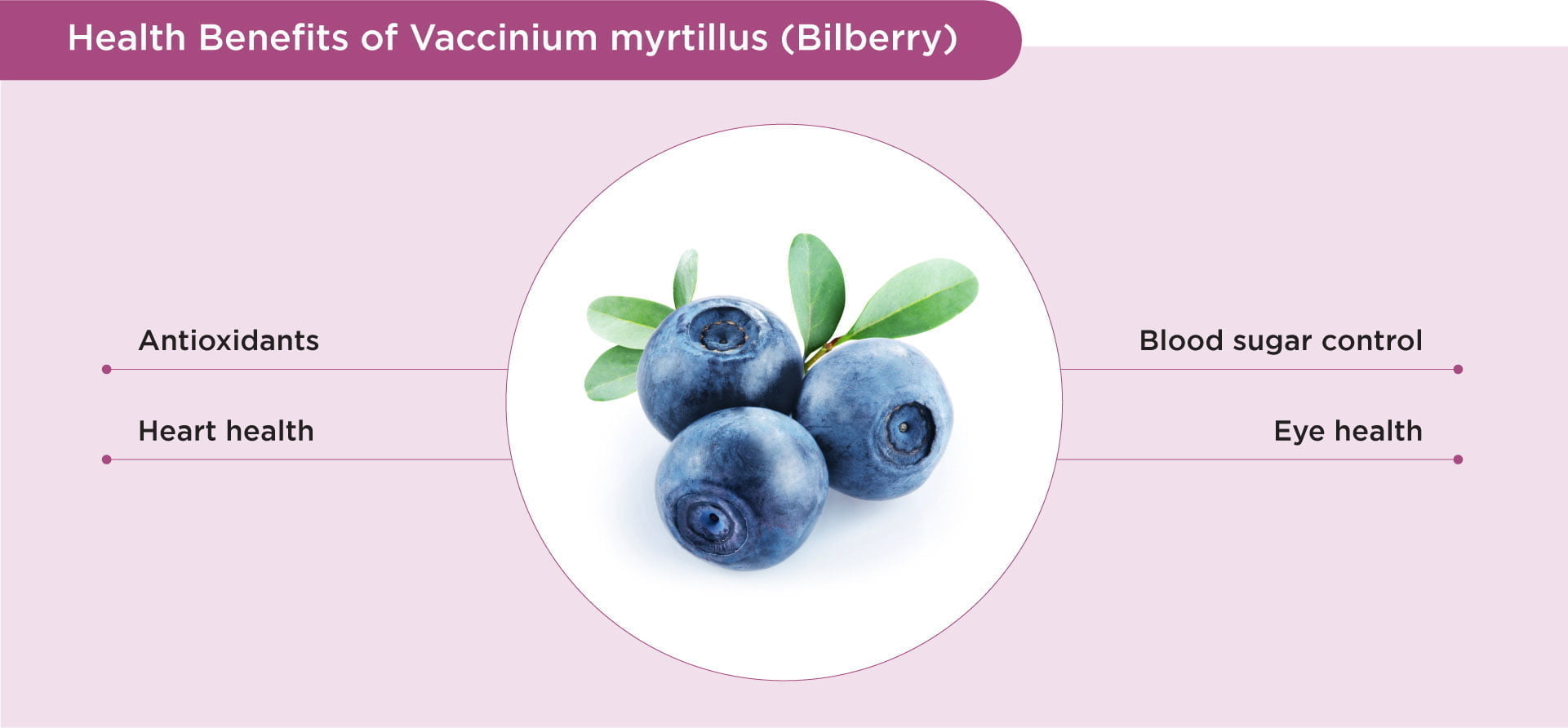Vaccinium myrtillus (Bilberry)

Vaccinium myrtillus (Bilberry)
Vaccinium myrtillus, also known as bilberry or European blueberry, is a perennial plant belonging to the Ericaceae family, native to northern Europe. The bilberry fruit is small with only 5 to 9mm in diameter and is bluish-black in colour 1. During World War II, British Pilots ate bilberry jam to improve their night vision 2. Vaccinium myrtillus has been used in folk medicine for centuries to treat a variety of conditions including diarrhoea, inflammation of the mouth, urinary problem, and diabetes 2.
Nutritional Facts
Vaccinium myrtillus contains a variety of phenolic compounds, including flavonols, tannins, ellagitannins, phenolic acids, and anthocyanins and these phenolic components give bilberry its blue/black colour and high antioxidant content 1. Bilberry is also a rich source of minerals. It contains three main macroelements (calcium, phosphorus, and magnesium) and seven microelements (iron, barium, sodium, manganese, copper, strontium, and zinc) 3.
Published Health Benefits
1. Antioxidants
The fruit of Vaccinium myrtillus is rich in antioxidants, which are beneficial in protecting the body against damage and disease associated with oxidative stress such as cardiovascular disease and diabetes 1.
2. Heart Health
Vaccinium myrtillus possess antioxidant and anti-inflammatory effects which are beneficial to the heart. Anthocyanins in bilberry strengthen the blood vessels and improve blood circulation. Anthocyanins also regulate blood pressure by inhibiting smooth muscle contraction, dilates blood vessels and prevent the formation of blood clots 1,3.
3. Blood Sugar Control
Anthocyanins in Vaccinium myrtillus stimulate the secretion of insulin and enhance glucose utilisation by the muscle cells, thereby regulates blood sugar levels in adults with type 2 diabetes 1,4.
4. Eye Health
Vaccinium myrtillus extracts are beneficial in improving eyesight. It has been shown to improve night vision, delay age-related macular degeneration, alleviate dry eyes, prevent cataracts and diabetic retinopathy 1,3.
References:
1. Chu, W. K., Cheung, S., Lau, R., & Benzie, I. (2011). Bilberry (Vaccinium myrtillus L.). In I. Benzie (Eds.) et. al., Herbal Medicine: Biomolecular and Clinical Aspects. (2nd ed.). CRC Press/Taylor & Francis.
2. National Institutes of Health: Bilberry https://www.nccih.nih.gov/health/bilberry
3. Pires, T., Caleja, C., Santos-Buelga, C., Barros, L., & Ferreira, I. (2020). Vaccinium myrtillus L. Fruits as a Novel Source of Phenolic Compounds with Health Benefits and Industrial Applications – A Review. Current pharmaceutical design, 26(16), 1917–1928. https://doi.org/10.2174/1381612826666200317132507
4. Kalt, W., Cassidy, A., Howard, L. R., Krikorian, R., Stull, A. J., Tremblay, F., & Zamora-Ros, R. (2020). Recent Research on the Health Benefits of Blueberries and Their Anthocyanins. Advances in nutrition (Bethesda, Md.), 11(2), 224–236. https://doi.org/10.1093/advances/nmz065


